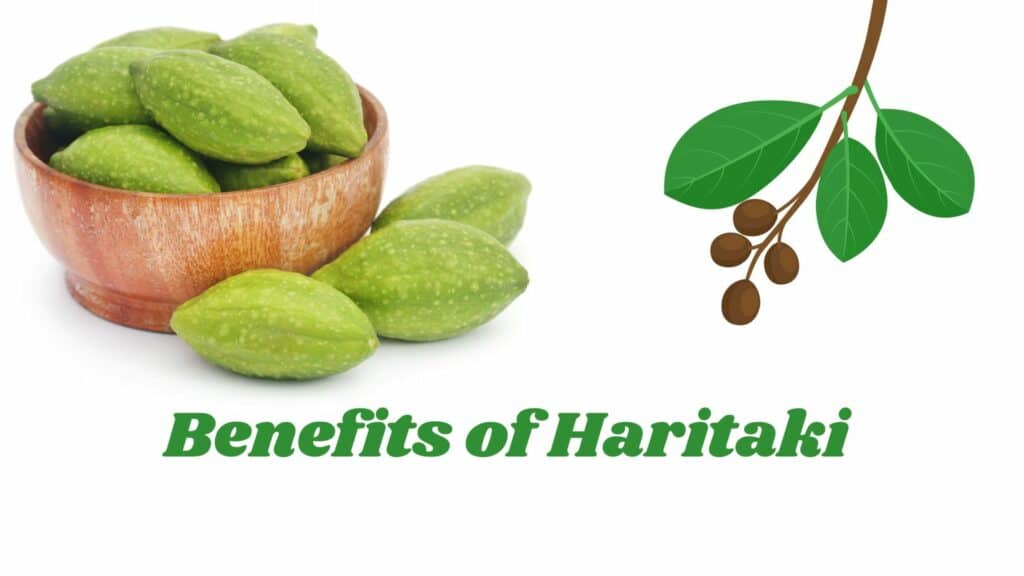Ayurveda – a form of traditional Indian medicine – has many natural remedies, and one such Ayurvedic herb is haritaki.
Widely used as a herbal supplement and Complementary Alternative Medicine (CAM), haritaki is prized for its many uses and health benefits.
However, many people are unfamiliar with this medicinal herb, so we’ll be looking at the types, applications and benefits of haritaki supplements in this article.
The myrobalan plum tree – often called haritaki – is widely used in Ayurvedic medicine, as the leaves, stem and fruit are all believed to contain medicinal compounds. While many traditional preparations contain dried leaves and seeds, most modern supplements use haritaki powder made from dried and ground fruit.
Haritaki has been used in Ayurvedic medicine for thousands of years, and practitioners believe it has various health benefits for your skin, gut health, brain function, and more. This relatively common but largely unknown herb has many potential benefits, as it has anti-inflammatory and antioxidant properties, which we’ll examine later in this article.
Table of Contents
What is Haritaki?
Haritaki, also known as Terminalia chebula or black- or chebulic myrobalan, is a deciduous tree native to South Asia, including India, Nepal, Sri Lanka and Malaysia. Its fruit has been used in Ayurvedic medicine for thousands of years, and modern research has confirmed many haritaki benefits, leading to increased popularity as a herbal supplement.
Haritaki is also known as:
- “Harad” in Hindi and Urdu
- “Kadukkai” in Tamil
- “Hirada” in Marathi
- “Harītakī” in Sanskrit
- “Hilikha” in Assamese
The fruit is small, oblong, and shaped like a stone fruit (i.e. peaches or plums). They are often collected while green and unripe before being dried for haritaki supplements and herbal medicines. For the sake of simplicity, we will be referring to the tree, fruit, and supplements made from the Terminalia chebula tree as “haritaki” in this article.
Different Types of Haritaki
Haritaki is available in many forms, from dried leaves to powdered seeds, though they are most commonly sold as haritaki supplements in powder or capsule form. Hartitaki fruits are often judged based on where they were grown, their color, and shape, with the unripe fruits believed to have the most powerful haritaki benefits.
Haritaki comes in many forms, from haritaki powder to pastes and jam-like preparations made with ghee or sugar syrup. These types of haritaki supplements are meant to be used in different ways, so we’ve summarised them below to help you choose the right one:
- Powder – Versatile and widely available, haritaki powder can be mixed in drinks or added to food.
- Paste – Powder mixed with water, ghee, and/or other herbs, often used on the skin.
- Oils – Haritiaki-infused oils are often used on hair, nails, and skin.
- Capsules – Haritaki supplements often come in pills or tablets for convenient, reliable dosages.
Health Benefits of Haritaki
Haritaki has natural antioxidant and anti-inflammatory properties and contains many nutrients, including vitamin C, vitamin K, magnesium, amino acids, and flavonoids. Traditional medicine practitioners believe that haritaki can treat various health conditions, and modern research recognises many of these haritaki benefits.
Although more research is needed to determine how exactly it benefits humans, supplementing with haritaki powder has many health benefits, including:
Digestive Health:
Haritaki is widely known for its ability to promote digestive health, as it has laxative and anti-inflammatory effects, which may help promote regular bowel movements. Furthermore, haritaki benefits inflammation in the digestive tract which can alleviate inflammatory bowel disease symptoms.
Antioxidant and Antibacterial Protection
Haritaki powder is a rich source of powerful antioxidants like ellagic acid, gallic acid, chebulic acid, flavonol glycosides, selenium, and vitamin C that help protect your body from oxidative damage. Studies show that supplementing with haritaki can improve concentrations of antioxidants in the liver and kidneys, potentially preventing age-related diseases.
Immune System Support
Research shows that haritaki benefits the immune system by increasing the production of white blood cells that fight infections and diseases. Furthermore, haritaki contains many compounds (such as vitamin C) well known for boosting immune response.
Brain Health and Cognitive Function
Many practitioners of Ayurvedic medicine claim that haritaki improves brain power, and it is widely associated with Buddhist enlightenment, as the medicine buddha (Bhaisajyaguru) is often depicted holding the stem of a haritaki plant. Early research suggests that haritaki supplements have neuroprotective properties, and antioxidants like flavonoids help maintain cognitive health, so they may help support brain health and prevent age-related cognitive decline.
How to use Haritaki
Haritaki can be taken in many forms, and Ayurvedic preparations use various parts of the Terminalia chebula tree, including the leaves and bark. One of the most common ways to take haritaki is in the form of haritaki powder dissolved in warm water with optional honey or jaggery (unrefined sugar) to mask the bitter taste.
However, dietary supplements made from dried and powdered haritaki fruit are much more common in the West, and you can buy haritaki supplements from most online supplement shops. These modern dietary supplements usually come in pill or tablet form and are a convenient and reliable way to take haritaki, as most brands use quality control and third-party verification.
How long does it take haritaki to work?
Like many other herbal medicines, haritaki has various health benefits, although more research is needed to determine exactly how haritaki benefits the human body. As of writing, there isn’t sufficient human research to determine the exact dosage and time required for this supplement’s beneficial effects.
Herbal medicine isn’t a one-and-done deal, so it may take weeks or months for haritaki supplements to have a noticeable benefit for some health conditions. Generally speaking, you should start with a smaller dose of haritaki for a couple of weeks and slowly increase your dosage until you start to notice the effects.
Cosmetic Uses
In addition to dietary supplements, haritaki is often added to cosmetic products like lotions and hair oils, as it may help support healthy skin, hair and nails. Studies show that topical applications of haritaki benefits dry skin, brittle hair and nailbed infections thanks to its anti-inflammatory, antioxidant and antimicrobial properties.
Side Effects/Potential Risks
While haritaki has many known health benefits, it may not be suitable for everyone and can cause adverse effects like stomach discomfort. Haritaki powder and dietary supplements are generally considered safe, but you should avoid using haritaki if you:
- Are pregnant – Haritaki supplements may interfere with pregnancies, so avoid taking them when pregnant or breastfeeding.
- Take anti-glycemic medication – Haritaki can lower your blood sugar, so avoid using it with anti-glycemic meds.
- Have diarrhea – Haritaki has known laxative effects, so avoid taking it when suffering from diarrhea.
- Recently donated blood – Haritaki powder has powerful astringent properties, which can slow the recovery process after donating blood.
Conclusion
The haritaki tree, also known as Terminalia chebula is revered in traditional Ayurvedic medicine, and modern science has confirmed many of its purported health benefits, making it a promising dietary supplement. Haritaki has many potential health benefits, and research shows that haritaki benefits the digestive system, immune response, and brain health.
However, haritaki powder may cause adverse side effects, especially in people suffering from dehydration or those who aren’t used to it. As with any dietary supplement, we strongly recommend asking your doctor if haritaki supplements are right for you before starting a new supplement regimen.





